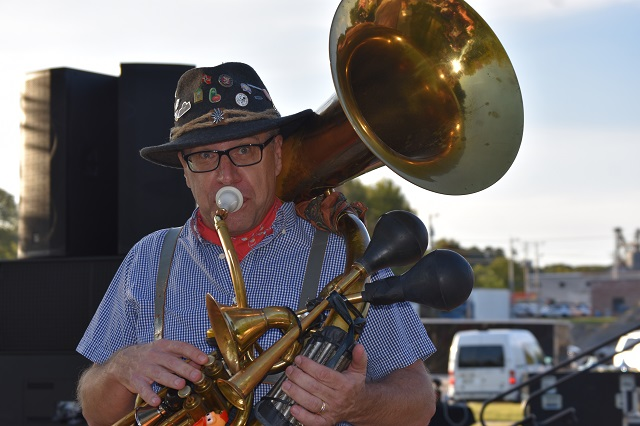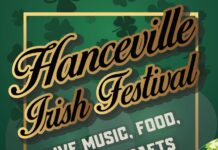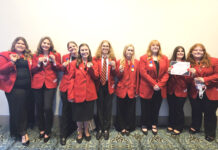CULLMAN, Ala. – This Thursday evening, Cullman will kick off its 40th Oktoberfest at the Festhalle, tapping the kegs, striking up the band and kicking off the city’s biggest celebration. But what is Oktoberfest, and why does Cullman observe it?
On Oct. 12, 1510, the royal family of Bavaria invited the citizens of Munich to a five-day public celebration of the marriage of Crown Prince Ludwig to Princess Therese of Saxony-Hildburghausen, with festivities including a parade and horse races. A year later, the city repeated the celebration, adding an agricultural fair, and Oktoberfest was born. In 1818, the festival grew again with the addition of carnival booths. Over the years, other cities began to copy Munich’s idea and Oktoberfest became a worldwide celebration of German heritage, not to mention a fair excuse to down a little beer and sausage.
Bavaria comes to Alabama
When Bavarian John Cullman established the settlement that bears his name in 1873, he invited his German countrymen to join him. As late as 1899, a visitor noted, “A stay in Cullman is the next thing to a trip to Germany. Everything is foreign.”
By the late 1890’s, Cullman was holding “German Day” in June, marking the anniversary of the city’s incorporation; though some sources also claim that a German Day was held in the fall. Whenever occurring, it was a one-day event featuring a parade, speeches and an evening ball. The celebration lasted at least through 1915, when a note in a Winston County paper said that Cullman’s German Day had been held on June 10, adding with a touch of humor that President Woodrow Wilson (who had just taken a hard stand against Germany in the wake of the sinking of the Lusitania) had not been invited to the party. German Day seems to have faded away as Cullman made its way farther into the 20th century.
Over the years, Cullman became less German in its culture, taking more pride in its growing reputation as a progressive city. In 1939, the town adopted a new annual celebration that focused not on culture but agriculture: the Strawberry Festival.
Then came Cullman’s centennial in the 1970’s. Growing interest in the area’s German heritage led to the 1976 opening of the Cullman County Museum in a reconstruction of Col. Cullman’s home, an event attended by the Mayor of Frankweiler, Germany, John Cullman’s hometown. In this atmosphere, an encounter with the Bavarian celebration was inevitable.
The Sacred Heart German Festival
Sacred Heart of Jesus Catholic Church was established in 1877, only four years after the settlement and three years after the incorporation of Cullman. In 1977, the church celebrated its first hundred years in the wake of the city’s centennial while interest in all things German was still running high.
The one-day celebration, held in June of that year, was labeled a “German Festival” and featured an array of German foods (and American specialties like hamburgers for those with simpler tastes), banners decorating city streets, a poster contest for children at Sacred Heart School and Oktoberfest-style booths with carnival games. The event was successful enough to bear repeating and became an annual fundraiser for the school.
In 1982, the Cullman Downtown Merchants Association joined with Sacred Heart to create a week-long fall celebration that culminated in the school’s event. In that year, the German Festival became Oktoberfest, with one small difference from its Bavarian counterpart–there was no beer.
Dry Oktoberfest
In Cullman’s early days, the city and county had their fill of beer, wine and liquor. The city had saloons and brewers with their own recipes. To the north, Vinemont got its name from its wine-producing vineyards, and John Cullman himself organized the Wine Company of Cullman. The area was known especially for its sweet wines.
That changed in the 1930’s when, led by cultural shifts and Baptist ministers, citizens voted Cullman County dry. In 1982, the city’s first official Oktoberfest featured root beer, a tradition that continues to this day. Along the way, Cullmanites would also sip “Octoberzest,” a custom-brewed non-alcoholic apple cider. Some think that the dry celebration may have been the only official Oktoberfest in the world with no beer; carnival games, festivities, Miss Oktoberfests, wiener dog races, car shows and more, but no beer.
Cullman’s was a small celebration, and many felt that the lack of beer was holding back both the event and the city. Cullman’s dry status has been said to have negatively affected decisions to locate businesses and industries to the area, and rumors even circulated that Mercedes chose Tuscaloosa over Cullman for its Alabama auto plant because Tuscaloosa had alcohol.
Prost! (“Cheers!” in German)
Alcohol aficionados made several unsuccessful attempts at a wet Cullman over the years until November 2010, when voters passed a measure to bring in alcohol on a basis somewhat more limited than many places. Cullman would see restaurants with bars, but not bars without restaurants, and on Oct. 5, 2011, Cullman would see real beer flow from the tap at Oktoberfest.
Since the first wet Oktoberfest, the event has lived up to pro-beer predictions, drawing crowds of over 10,000 for the big Saturday that closes the celebration.
Why is the hay wearing lederhosen?
A couple of Cullman’s more visible Oktoberfest features are the pairs of giant hay people located downtown and at Depot Park. In 1999, Phillip and Pat Clemmons traveled to Germany and saw similar decorations at Oktoberfest celebrations there, so they returned with the idea and set to work on making the tradition a Cullman reality. In 2000, using hay from their own farm and help from friends and family, they set up hay couples at locations around town. Pat Clemmons also supplied the mums that were displayed all over Cullman around Oktoberfest. The Clemmons’ children, helped by others, continued the tradition after the couple died in a plane crash in 2008.
Cullman honored the memory of Pat and Phillip Clemmons by declaring them the 2008 Burgermeisters. Their children carried out their duties.
Oktoberfest today
Today’s Oktoberfest is one of the biggest annual events in Cullman, featuring live traditional and contemporary music, Miss Oktoberfest contest, farmers’ market, craft show, historical walking tours, wiener dog races and pet costume contest, children’s activities, car show, 5K and 10K runs, food vendors and a biergarten. Several local churches also put on German dinners and other activities during the week.
Burgermeisters
A variety of men and women have served as Cullman Oktoberfest Burgermeisters, honorary mayors for the week, including:
1982 – Carl Stiefelmeyer
1983 – Bob McGukin
1984 – Ann Gregath
1985 – Hubert Richter
1986 – Jim Swofford
1987 – Raymond Yost
1988 – Pat Clark
1989 – Ralph Kreps
1990 – George Warnke
1991 – Greg Clark
1992 – Otto Evers
1993 – Dean Misegades
1994 – Jane Mize
1995 – Fred Hale
1996 – Rev. Robert Kurtz
1997 – Fred Abt
1998 – Rev. Harold Hermetz
1999 – Herman Bergner
2000 – Al Grobe
2001 – Larry Rowlette
2002 – Grady Griffin
2003 – Pat Kurtz
2004 – Donald Green
2005 – Judy Brown
2006 – Ernest Hauk
2007 – Pete Misegades
2008 – Phillip and Pat Clemmons (honored posthumously)
2009 – Roy Drinkard
2010 – Angie Jochum
2011 – Michael Sullins
2012 – Nancy Moore
2013 – Marsha Franks
2014 – Vicki Karolewics
2015 – Nicole Vance
2016 – Rev. John Richter
2017 – John Dean
2018 – Ben Harrison
2019 – Steve Moore
2020 – Steve Sides
Cullman High School teacher and coach Casey Harbin is Burgermeister for the 2021 Cullman Oktoberfest.
“It has been more of a fantasy than a goal!”, Harbin laughed. “My friends and I joked about being the Burgermeister for years, but I never really considered it a reality. Even in July, when someone said they nominated me, I responded with, ‘Haha, well thanks but I doubt that will ever happen!’ And here we sit.”
Harbin spent time making public appearances and visiting sponsors leading up to Oktoberfest. When the festival starts, he will serve as Master of Ceremonies.
Said Harbin, “Mostly, I am there to keep things fun and entertaining for everyone!”
Harbin shared, “Being the Burgermeister means so much to me. Not only do I have the opportunity to represent my amazing family and their contributions to Oktoberfest over the years, but also to represent the incredible school system that has been such a big part of my life the last decade.”
Oktoberfest 2021 Schedule
Thursday
- Introduction of 2021 Burgermeister, 5 p.m.
- Biergarten opens, 5 p.m.
- Opening ceremony and tapping of the keg, 6 p.m.
- Miss Oktoberfest crowned, 6:30 p.m.
- Candlelight walking tour, 7 p.m.
- Cullman Community Band, 7-8 p.m.
- Polkawagen, 8-9 p.m.
Friday
- Senior Day at Festhalle, 10 a.m.-2 p.m.
- Biergarten, kids’ area, pumpkin patch open, 4 p.m.
- Polkawagen, 4-5 p.m.
- Pickle eating contest at main stage, 5 p.m.
- The Overtones, 5:30-6:30 p.m.
- The Pine Hill Haints, 6:30-7:30 p.m.
- Cornhole tournament registration, 6:30 p.m.
- Paper airplane contest at kids’ area, 7 p.m.
- Cornhole tournament at Festhalle, 7:30 p.m.
- Stein hoisting contest at main stage, 7:30 p.m.
- Avenue G Band, 8-10 p.m.
Saturday
- 5K and 10K registration, 7 a.m.
- Craft show opens, 9 a.m.
- Cullman Middle School and Cullman High School Choirs, 9-10 a.m.
- Oktofurfest (weiner dog race, costume contest, pet parade) opens, 10 a.m.
- Biergarten, kids’ area, pumpkin patch open, 10 a.m.
- Imagination Library performance of “Coat of Many Colors,” 11 a.m.
- Wallace State Jazz Band and Singers, 12-1 p.m.
- Axe throwing contest qualifier, 12 noon
- Oom-Pah-Calypse, 1-2 p.m.
- Brat eating contest at main stage, 2 p.m.
- Pickle eating contest, 2 p.m.
- German car show, 2 p.m.
- Paper airplane contest at kids’ area, 3 p.m.
- Polkawagen, 3-3:45 p.m.
- Cornhole Tournament at Goat Island, 4 p.m.
- Brez, 4-5 p.m.
- Lori Rayne Music, 5-6 p.m.
- Axe throwing tournament hosted by German Axe Throwing, 5 p.m.
- Stein hoisting and best dressed contests, 6 p.m.
- Round 2, 7-8 p.m.
- The Red Clay Strays, 8-10 p.m.
For more information or to register for events, visit https://www.cullmanoktoberfestival.com.
Copyright 2021 Humble Roots, LLC. All Rights Reserved.
























